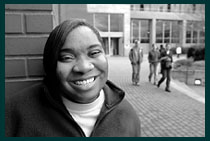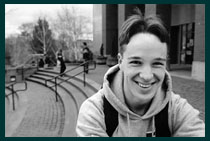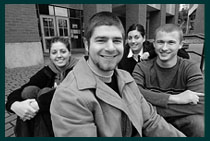Story by Clint Kelly
647
3.58
1146
9
40%
76%
61
29
5
54%
65
Photos by Jimi Lott
![]()
Size of class
Average high school GPA
Average SAT score
National Merit Scholars
in top 10% of high school class
in top 20% of high school class
Religious denominations and affiliations
U.S. states of origin
(Top 6 besides Washington: California,
oregon, Colorado, Idaho, Minnesota, hawaii)
Top five intended individual majors:
Business Administration, Psychology,
Communication, Biology, Nursing
Plan to attain A graduate degree
Have alumni parent(s

The Class of 2005 is the largest freshman class in the history of Seattle Pacific University. For the first time ever, admission of freshmen was cut off on June 1 because of an enrollment rate that would have exceeded capacity.
So who are the 647 freshman students who arrived on campus this September?
They include a member of the National Society of Black Engineers, a Sons of Norway Borderfest princess, a volunteer rescuer of the USS Missouri, a participant in Upward Bound and a student who holds a black belt in Taekwondo.
They have traveled to places about which their parents could only dream. Collectively, the members of this year's incoming class had been on more than 300 mission trips — to distant locales that include Chile, Nepal, Slovakia and Trinidad — before they ever even arrived on campus.
They are the products of an affluent society. Many have grown up not only with their own rooms, but also with their own computers, TVs, bathrooms and cars. Ninety-eight percent could access the Internet from their homes.
They are also young adults who want a university education that is academically and culturally sophisticated. Their high school grade point average (3.58) and SAT scores (1146) hint at the motivation they display in the classroom. A full 38.6 percent of them arrived with a grade point average of 3.76 percent or higher. "I am teaching at a little higher level, and my mean scores are going up," reports Ken Moore, professor of biology and coordinator of the pre-med program. "This speaks to the increased abilities of our students."
The single largest group of freshmen, 18.7 percent, anticipates choosing majors within the fields of science and engineering. Some students have come in search of SPU's niche programs that are found at few, if any, Christian schools — programs like dietetics, apparel design, theatre or exercise science. "We are the only Christian college in the country with a gymnastics program," says Laurel Tindall, head coach and director of the Falcons Gymnastics Center. "I have freshman athletes who chose Seattle Pacific based solely on gymnastics."
Representing 61 different religious denominations and affiliations, these students say that a career for the sake of monetary gain is not appealing. For most, their vision of the future is rooted in a commitment to the Christian faith, and so they seek higher education that is a "mission-fit" with that faith. They are attracted to the concept of "engaging the culture" with the gospel — if it means more than worship and Bible study. They want to take action through urban and overseas ministry.
In many ways, members of this year's freshman class are especially well-suited for the complex world they have inherited. They have experienced more of everything and come to campus arguably more savvy and worldly wise than any class before them. They are technologically adept and possess a cultural awareness perhaps unprecedented in American history. "In significant ways, they illustrate the biblical standard of 'to whom much is given, much is expected,'" says Vice President for Academic Affairs Les Steele. "We hope to help equip them for the vocations of their choice, through which they can give back."
It is at a much deeper level that the incoming freshmen's true colors — and potential for making a contribution — may best be gauged. Studies suggest that today's students arrive at U.S. universities like Seattle Pacific a bit wounded. They have been through the emotional mill to a greater degree than earlier generations. Many come having experienced family break-ups, substance abuse, emotional disorders or other significant stresses, often in combination. They also sense a loss of innocence and emotional fatigue since September 11 and harbor unnamed fears born of terrorist attacks, anthrax, war and economic uncertainty. Because of their wounds, they come to higher education wary of the "easy path." To Kathleen Braden, dean of students, this year's freshman class is "the exact right group at the exact right time" to make a difference in the world of today. "They need the wisdom and timelessness of SPU's mission," she says. "We, in turn, need their energy, street smarts and strong shoulders." She says she senses that this is a class of students able to judge what is real and sincere, and who stand ready to respond.
Steele echoes that assessment. "From my experience with the freshman class, these students are both vulnerable and looking for deeper, more thoughtful ways of living. They are seeing the violent realities of intolerance and hatred, and want to bring about positive change."
Though sobered in many ways by the world situation, the Class of 2005 brought to campus a youthful idealism, healthy intellectual curiosity, and hunger and thirst to serve. SPU, they say, has presented them with a challenge in learning and service they are eager to accept.
A MISSION-FIT
Charisse Everett thought she pretty much had her ducks in a row. The
hard-working
student at Seattle's Franklin High School had settled on Washington State
University
during her junior year. She planned to major in education, and even took
college
prep courses with the goal of becoming a teacher.
But she worried that WSU would not be an ideal match. Increasingly,
"mission-fit"
tips the scales when it comes to college choice, especially for the
Christian high
school students who comprise SPU's largest applicant pool. Will a university
respect
and enrich a student's religious and moral convictions? Will the campus
atmosphere
promote growth in these areas?
"I saw right from the beginning that Seattle Pacific values the Christian
faith —
from the institutional mission statement, to the application essay topics,
to the
Christian Faith Exploration options," says Everett, who as a high school
senior
participated in the University of Washington's "Young, Black and Gifted"
program.
"I was looking to strengthen my relationship with God, and SPU has done
that,
even in the busy first quarter. Anywhere else in society, the topic of
religion
is hush-hush. But here you can express yourself freely."
Mission-fit applies to other areas of campus life as well. One of Everett's
goals
for college was to build personal relationships with her professors. "It's
happened!"
she exclaims. "They all know me by my first name. Do you know how
encouraging that is?"
For Everett, who wondered if college would be too hard to handle, the
University's
helping atmosphere is a godsend. From her peer advisors to the tutors in the
Center
for Learning, she has found "someone to help me, to motivate me. I'm shocked
at
how well I'm coping. I can do this!"
Now Everett has decided to major in sociology and become a social worker. "I
like
to help people with their problems," says the former junior high and high
school
peer mediator. Since SPU offers majors in sociology, social service and
social
science education, it would seem that the mission-fit for Charisse Everett
is tailor-made.
 Charisse Everett
Charisse Everett
Seattle, Washington
AN ACADEMIC CHALLENGE
National Merit Scholars are among the top academic achievers in the nation.
Of
the more than one million high school seniors who compete for the honor each
year,
only about 8,000 receive a National Merit Scholarship in recognition of
their
academic record, personal character and scores on the PSAT, a nationally
administered
test. Twenty-six of these scholars now study at Seattle Pacific University.
One of nine National Merit Scholars in this year's freshman class, Greg
Edvenson
receives a scholarship of $10,000 a year, 80 percent funded by SPU and 20
percent
by the National Merit Foundation. His primary academic interest is computer
science.
"I've always liked to take things apart, to experiment," says Edvenson. "I
like
learning a lot, and with computers, I think it's easy to see how they work."
As a National Merit Scholar, Edvenson was a desirable candidate for any
number
of schools and had at first narrowed his sights to the excellent computer
science
programs at the University of Wisconsin at Madison or the University of
Minnesota.
But then he heard about Seattle Pacific from a friend, fellow freshman and
National
Merit Scholar Britt-Marie Lorenzen, who heard about it from SPU alumna Joy
Friedberg.
Edvenson visited campus, sampled some classes and liked what he saw: quality
computer
science and computer engineering programs; a prominent faculty; a new
science facility
under construction; and a challenging University Scholars program with a
"faith
and science" sequence not to be found at a state school.
The options afforded by a major city were another draw. "Seattle has lots of
possibilities for computer internships and exploring the field," says
Edvenson.
In order to be challenged intellectually, Edvenson wanted to attend a
university
that could stimulate on several levels. Because his family had lived for a
year
in Bangladesh, he particularly enjoyed the University Scholars program's
first-quarter
emphasis on "encounters between different cultures." He regularly attends a
cadre
for children of missionaries in partial fulfillment of the Christian Faith
Exploration
requirement.
It can be difficult to keep a National Merit Scholar challenged. But as Greg
Edvenson will testify, his studies at Seattle Pacific are off to an
invigorating start.
 Greg Edvenson
Greg Edvenson
Moorhead, Minnesota
A NEW HOME BASE
More than four out of every 10 members of the Class of 2005 hail from
outside
Washington state. There are students from 28 other states, including four
close
friends from Massachusetts.
Emily Haddad first had the itch to go west for college. She enjoys change,
and
Seattle sounded perfect — different weather, different attitude, lots
to do.
She had three friends at Whitinsville Christian High School, an hour outside
of
Boston, who were close as family. They'd hung out together for years, so why
wouldn't they consider going to college together? A year ago, the four flew
to
Seattle and visited the SPU campus.
They came away impressed. Katie Eaton could pursue exercise science. Anthony
Bastone
could study business. And Steve Muscolino and Haddad, who are still
undecided
about their majors, could begin general studies and see what unfolded.
The two women are now roommates in Ashton Hall, and the two men are just a
couple
of doors down from each other in Emerson Hall. Moving together has made the
transition
from one coast to the other much easier on all of them. They say they love
the
city of Seattle and getting away from life "in the middle of nowhere" in
small-town
Massachusetts. The Massachusetts Four particularly appreciate the Christian
commitment at SPU. "There are so many ways here to grow in the faith," says
Haddad.
"I wanted a college that was academically sophisticated, yet involved in
people's
lives both inside and outside the community."
Bastone likes the mix of people and expressions of the Christian faith at
the
University. Some students have been "doing church" all their lives; others
are new
Christians; and some aren't Christians at all.
One student on the men's floor is a practicing Muslim. After September 11,
his
mosque was defaced and someone threatened worshippers with a gun. As a hall
service
project, Emerson residents, including Muscolino, rallied behind their friend
and
worked at the mosque cleaning, raking and clearing the neighborhood of
litter.
Muscolino wasn't surprised. He's personally experienced the same kind of
respect
since arriving at SPU.
Information used in this story was drawn from these sources: Premiere
survey (first-time
freshmen responses) on August 27, 2001; the SPU Office of Institutional
Research; and the SPU Office of Undergraduate Admissions. Statistics are
from
Autumn Quarter 2001, 10th day.
 Katie Eaton
Katie Eaton
Steve Muscolino
Emily HadDad
Anthony Bastone
(From left to right)
Whitinsville, Massachusetts
![]()

| Please read our
disclaimer.
Send any questions, comments or correspondence about Response to jgilnett@spu.edu or call 206-281-2051. Copyright © 2003 University Communications, Seattle Pacific University.
Seattle Pacific University |